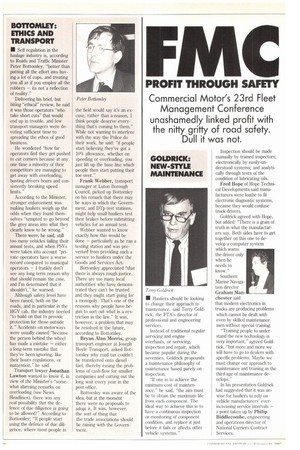BOTTOMLEY: ETHICS AND TRANSPORT
Page 28

If you've noticed an error in this article please click here to report it so we can fix it.
• Self regulation in the haulage industry is, according to Roads and Traffic Minister Peter Bottomley, "better than putting all the effort into having a lot of cops, and treating you all as if you employ all the robbers — its not a reflection of reality."
Delivering his brief, but biting "ethical" review, he said it was those operators "who take short cuts" that would end up in trouble, and few transport managers were devoting sufficient time to spreading the ethos of good business.
He wondered "how far operators find they get pushed to cut corners because at any one time a minority of their competitors are managing to get away with overloading, busting drivers hours and consistently breaking speed limits."
According to the Minister, stronger enforcement was making hauliers weigh up the odds when they found themselves "tempted to go beyond the grey areas into what they clearly know to be wrong."
There were, he said, still too many vehicles failing their annual tests, and when PSVs were taken into account "private operators have a worse record compared to municipal operators — I frankly don't see any long term reason why that should remain the case, and I'm determined that it shouldn't," he warned.
Although safety level have been raised, both on the roads, and in particular in the HGV cab, the industry needed "to build on that to provide protection for those outside it." Accidents on motorways were usually caused "because the person behind the wheel has made a mistake — either a long-term mistake that they've been ignoring, like their hours regulations, or inattention," he said.
Transport lawyer Jonathan Lawton wanted to know if, in view of the Minister's "somewhat alarming remarks on overloading (see News Headlines), there was any real possibility that the defence of due diligence is going to be allowed?" According to Bottomley: "If people start using the defence of due diligence, where most people in
the field would say it's an excuse, rather than a reason, I think people deserve everything that's coming to them." While not wanting to interfere with the way the Police do their work, he said: "if people start believing they've got a lOck allowance, whether on speeding or overloading, you just lift up the base line which people then start putting their toe over."
Frank Webber, transport manager at Luton Borough Council, picked up Bottomley on his remark that there may be ways in which the Government, and Dip test stations, might help small hauliers test their brakes before submitting vehicles for an annual test.
Webber wanted to know exactly how this would be done — particularly as he ran a testing station and was prevented from providing such a service to hauliers under the Goods and Services Act.
Bottomley appreciated "that there is always rough justice. There are too many local authorities who have demonstrated they can't be trusted and they might start going for a monopoly. That's one of the reasons why people have begun to sort out what is a restriction in the law." It was, however, a problem that may be resolved in the future, according to Bottomley.
Bryan Alan Morris, group transport engineer at Joseph Hoyle Transport, asked Bottomley why road tax couldn't be transferred onto diesel fuel, thereby easing the problems of cash-flow for smaller companies and cutting out the long wait every year in the post office.
Bottomley was aware of the idea, but at the moment there were no proposals to adopt it. It was, however, the sort of thing that the trade associations should be raising with the Government.




















































































